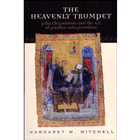a quasi-review; or, how having saints secures jesus' divinity
 Strange title, I know. Bear with me.
Strange title, I know. Bear with me.
 Strange title, I know. Bear with me.
Strange title, I know. Bear with me.
In my 2 Corinthians class, we have been discussing various interpretations of Paul's soteriology/theology of atonement. One of the books we read, Paul on the Cross by David Brondos, highlights the deficiencies of several "popular" (though I'm not using that word in a derogatory fashion, simply trying to connote something that has held the most weight for the longest time) readings of Paul particularly on Jesus' death and resurrection. That we should be reading such is ironic, especially since Dr. Reese didn't think about these readings' proximity to Holy Week beforehand.
 Heresies and How to Avoid Them: Why It Matters What Christians Believe
Heresies and How to Avoid Them: Why It Matters What Christians Believe
I think I've determined that the thing I like most about this book is more the door it opens on discussion than the book itself. Heresies and How to Avoid Them is a collection of sermessays (yes, that's a word...but only because I just created it) originally delivered by a number of Anglican pastors as a sermon series, and later spiffed up into a series of essay. So just in that regard, this is a valuable journey into the realm of uniting history/serious theology with laypeople's thirst for instruction. The authors cover nearly every major early heresy in the Church, starting with the first four main Christological errors dealt with via conciliar action (Adoptionism, Docetism, Nestorianism, and Arianism), then moving on to others of the writers' choosing (such as Marcionism, Pelagianism, and Donatism). The typical chapter will include an attempt at a scriptural connection to these teachings (though in some cases they seem to be completely unrelated), somewhat of a historical survey of the debate, and then the attempt at application.
Now, as a super-brief expose on heresy for laypeople, this book is good. As a manual for how to think theologically orthodox, this book is not so good. It creates unfortunately high hopes just in its subtitle; yet at the end of each chapter, no matter how good the chapter was (there were three or four solid historical treatments, chapters which I was thoroughly impressed with), the take-away was the same: don't be like this. The heretic/heretical group was always a misguided good guy, portrayed as someone/people who really were striving for the truth, but somehow got lost along the way. Though the book certainly correctly notes that not all heretics were burned or utterly dismembered for their teachings, it does overemphasize how heretics have historically been villainized - almost to the point where I found myself thinking, "Well, maybe it doesn't actually matter what I believe, since anyone who thinks differently is just a bully."
To me, this is unfortunate, because I firmly hold that it does matter what we believe, and heresies/heretics are not just lessons in veering off the path. Yes, I believe that character slandering went on, and shouldn't have. However, for some reason we have forgotten that the quest for orthodoxy, despite what those suspicious of the metastructure of the Church would say, was founded primarily on the Church's passion for God - for remaining as close as possible to revelation with faith and the understanding that belief and behavior are two sides of the same coin. I really, honestly do not think the Fathers separated belief from action. So despite the fact that Pelagius might have acted like a pious man - indeed Augustine himself heralded him as such - the real danger in Pelagianism lay in the genetic passing on of its traits and characteristics. Augustine saw that it did not teach the full truth, that we are saved by faith through grace, the evidence of which is displayed in our works, and thus was doomed to created less-than-Christians. So it's not enough, I think, for a sermon to simply lay out a historical debate and then shake its finger at the audience, saying, "Don't be like that!" Obviously we don't want to be heretical, because by the nature of the sermon it has been determined that heresy is bad (though in some circles that is actually the first hurdle to leap); so there must be something else there.
In my conversation with Dr. Pasquarello concerning this book, we did determine that it has one great use - as a tool in homiletics courses. Hearing about a certain heresy in a sermon is a surprisingly good connector to hearing the heresy itself in a sermon. That is, the student could read the chapter on, for instance, theopaschitism, and say, "What would this sound like in a sermon? How can I preach truth and avoid this error?" If these seem like moot questions, either 1) you haven't spent enough time in church, or 2) you haven't spent enough time studying heresy. This isn't a witch-hunt sort of exercise, but a genuine exercise in desiring to preach faithfully the Word of God and the Rule of Faith.
So, to recap: good book, but only if you plan on doing something about it. If you aren't convinced at the end that it does matter what Christians believe, read another book, talk to me, or consider helping fund my doctoral work :-).